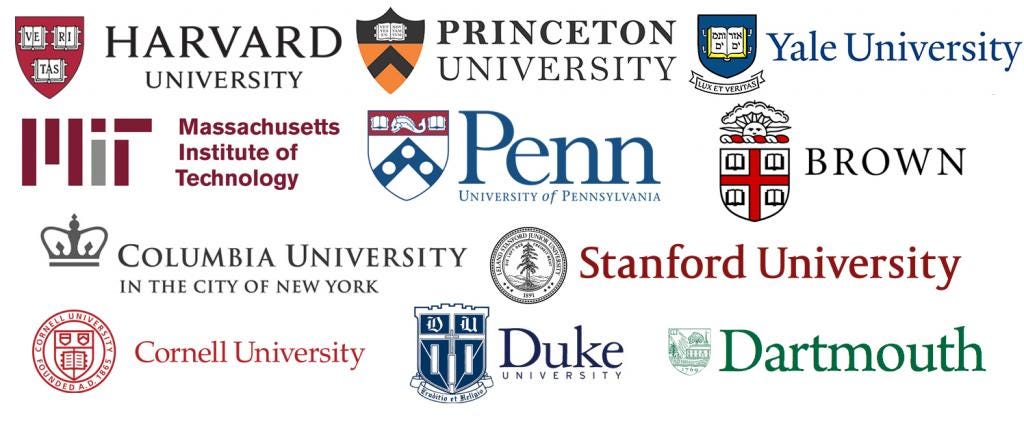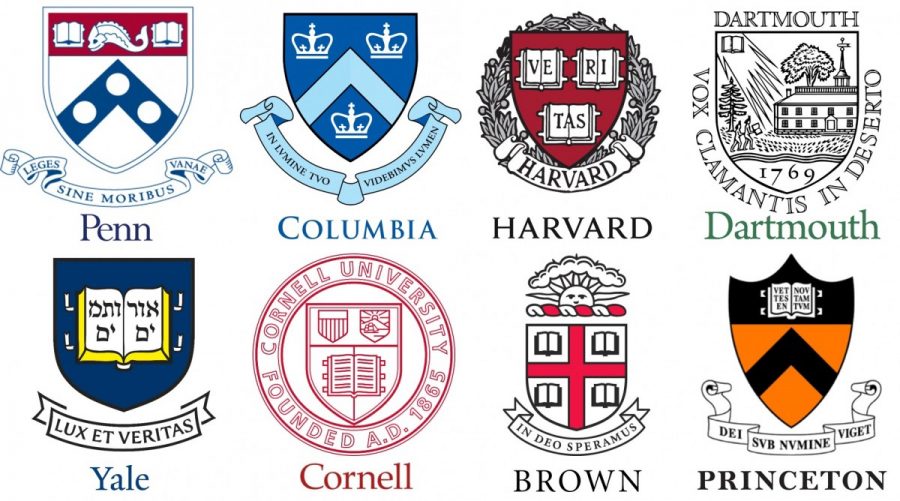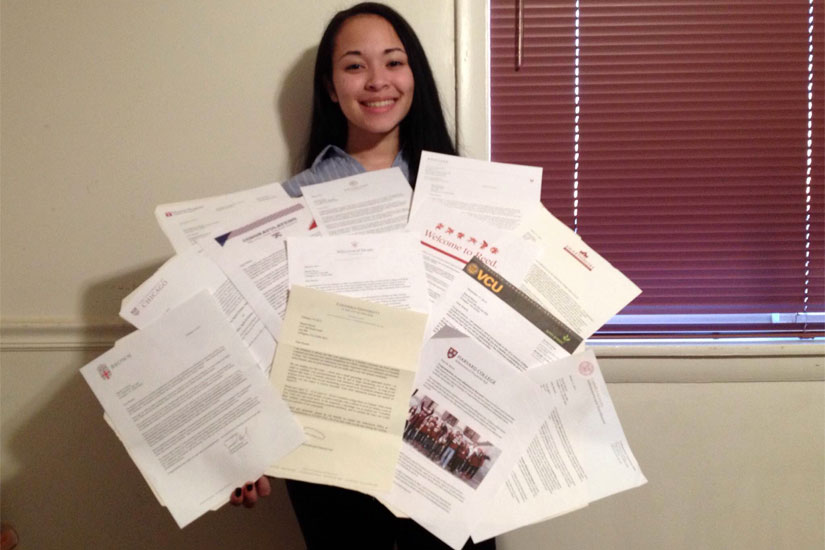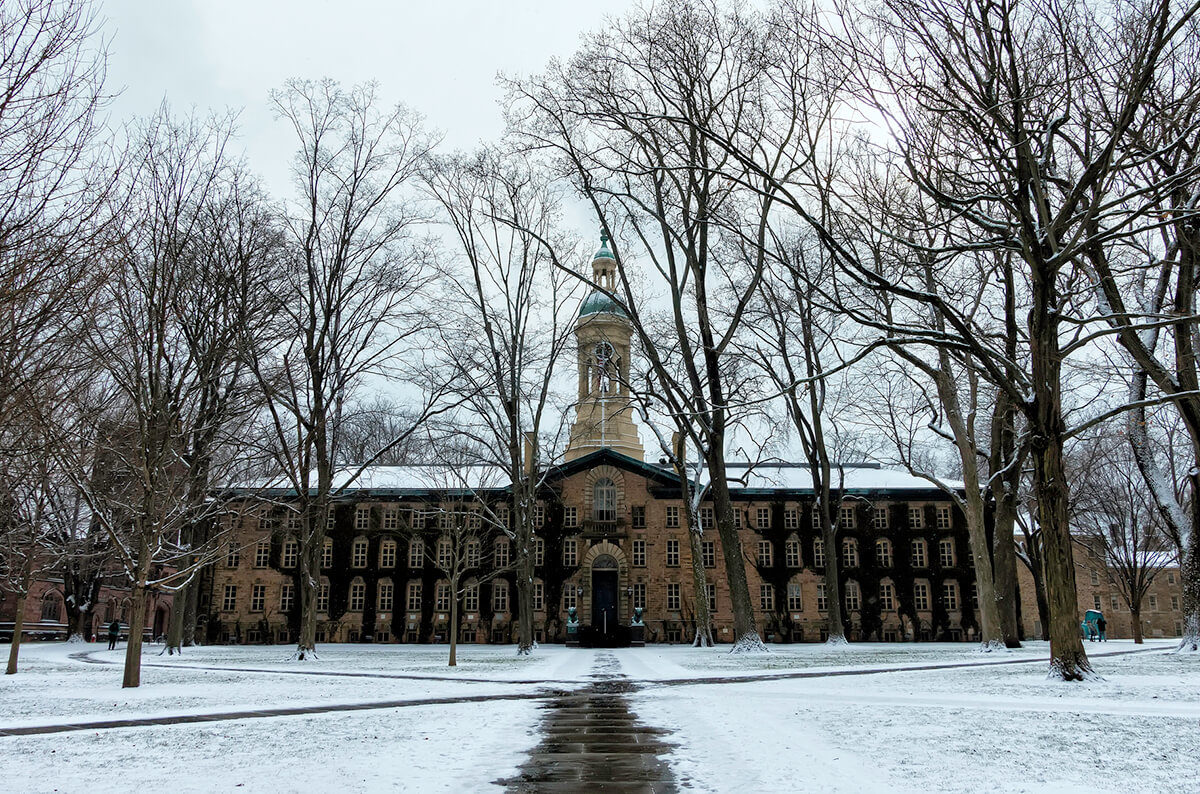Ivy League school expectations for GPAs are set extremely high — they have some of the lowest acceptance rates around and it can be hard to stand out in an impressive applicant pool. There are, however, other factors that play significant roles in college admissions, especially with the use of holistic evaluation. Although Cornell University has the highest acceptance rates of all Ivy League schools, this does not mean that it's an easy school to get into. To be a competitive applicant for any of these eight prestigious institutions, you cannot slack off when it comes to your applications.
Start planning your acceptance strategies early, which means studying hard at school and planning ahead for your standardized tests. If you have not been involved in an extracurricular activity since childhood, plan to seriously commit to an activity as early as you can. Choose something you love to do as this will be evident in your application components. Most importantly, do not choose to go to an Ivy League school for appearances. Choose a program you actually want to attend and graduate from, rather than a program that will look good on your CV.
Prestige and social status do not necessarily translate into better educational fit for you. Choose happiness and invest in your education in a school you truly want to attend. It is easy to say "plan ahead", but there is a lot of advantage in knowing what school and program you would like to attend in the future. If you are certain about which school you want to enroll in, it might be wise to apply through the Early Action/Early Decision program. This way, your deadline for application is earlier, but so is your response date. To utilize this opportunity, you must research your school of choice and determine whether you are a good fit for the program to which you're applying.
Early Action programs give you an early answer as to where you stand in the admissions process. According to most recent data, Cornell's acceptance rates for their early decision program is 22.7%! There is no denying that obtaining an Ivy League education brings with it a sense of name recognition and prestige. These eight private institutions of higher learning are also known for their selective admissions processes, making them sought-after destinations for the best and brightest students.
Ivy League schools have a reputation for being elite institutions, with high selectivity during the admissions process. Harvard University is currently the most selective university in the country. Out of 57,435 applications received for the Class of 2025, Harvard admitted only 3.4 percent of applicants. While the admissions process is extremely selective, it is not impossible for first-generation students to earn a spot in these world-class schools.
For example, 16 percent of Yale's Class of 2025 are the first member of their family to attend university. However, the Ivy Leagues have recently come under fire for their admissions processes, which critics say favors legacy students to the detriment of minority students. For it to be worth applying to any of these schools, you should be performing at a very high level academically.
Even at the Ivies with acceptance rates above 8 percent , serious applicants have very impressive high school transcripts and test scores. At Cornell, for example, the average SAT score for admitted students is a 1480. These institutions are home to some of the most cutting-edge facilities in the world, their faculty members are leaders in their fields, and their alumni are highly accomplished as well. Now, if all schools consider these factors important in their admissions processes, consider how uncompromising Ivy League schools will be in their applicant choices. Due to the highly selective admissions process of these schools, they put a lot more value in all these factors.
They place more emphasis on grades and college prep courses; they pay more attention to your essay and writing sample; and they will certainly take a closer look at your recommendation letters, as well as your extracurriculars. You must not give admissions committees any reason to cut you out of the applicant pool. Ivy League undergraduate admissions are difficult to assess because each school claims to take a holistic approach to reviewing students' applications. A holistic application review considers a broad range of student's accomplishments and circumstances. This allows admissions committees to consider your candidacy as a whole, rather than focusing on only one component of your application.
A good example of this theory is the elimination of GPA stats for Brown's applicants. The college announced that it does not calculate its students' GPA and relies on other criteria for evaluation, such as students' coursework, course performance reports and letters of recommendation. As you might have noticed, the majority of the Ivy League schools do not have specific GPA or standardized test score requirements – all of this is meant to demonstrate that no ONE application component outweighs the other. It is located in Cambridge, Massachusetts, and is a medium-sized school with around 7,000 undergrad enrollments. Harvard is also a very competitive school as the acceptance rate is only 5%.
Accepted students' SAT grades typically range from 1460 to 1580, and their ACT grades range between 33 and 35. Harvard is rated #1 for biology studies and political science studies according to Niche's 2020 Best Colleges. University of the People is a member ofHarvard Business School Online's (HBS Online's) Collaborating Colleges program. Harvard Business School Online offers a unique and highly engaging way to learn vital business concepts via an innovative online platform that brings the Harvard Business School classroom to you. It makes sense for parents and students to consider the benefits of attending a school that has a broader acceptance rate.
Going to the right college — one that encourages collaborations among students of different ethnicities, socioeconomic backgrounds, etc. — allows students to challenge ideas and learn new ways of thinking about problems. While they have similar demands for academic excellence and extracurricular achievement, the number of students who apply to them is smaller, meaning that each qualified student has a greater chance of acceptance. These colleges are known for being selective in their admissions; since the year 2000, the acceptance rates at each of the universities is said to have varied from 6 to 16 percent. In fact, in the most recent academic year, seven of the eight Ivy League schools reported record-high applications; seven also reported record-low acceptance rates. Although it's important to always aim for the sky and dream big, setting realistic goals for yourself is just as important. Hundreds of colleges out there can deliver better education to admitted students than the Ivies.
Many of these schools, like "Public Ivy" universities are also more accessible and offer lower tuition fees, considering how the Ivies do not offer applicants any merit-based financial aid (only need-based aid). True, their programs are of high quality, and their instructors are top-notch, but they aren't the only institutions in the world that offer top-notch education. It's important to keep in mind that Ivy League colleges might be "cliquey." Every Ivy League school has a number of matriculants who are descendants of those schools' graduates. While it is unlikely to hurt your chances if you submit a strong application, it does raise questions about Ivy League nepotism. Remember to pick a school that you like and a program that you want to attend. If one of the Ivy Leagues offers a curriculum and subject that you are interested in, do not hesitate to apply.
This means that more than 85% of candidates get a rejection letter in the mail. Now, consider that rejected Ivy League applicants include some of the most successful, intelligent students in their respective classes. Most students find a good fit at other colleges, big and small, throughout the country. The lesson here is that there are many opportunities to get an excellent education and have a great college experience outside the Ivy League. Similar to a high GPA, high SAT or ACT scores demonstrate your academic aptitude to the admissions committee. An excellent way to gauge if your score is in the ballpark of where you need it to be for your application to an Ivy League school is to check its class profiles.
Ivy League schools offer exceptional educational opportunities but so do many other colleges in the US and worldwide. Schools like Stanford, MIT, Rice, and CalTech are not Ivy League schools but often rank higher in specific programs than some Ivy League schools. Many of them also offer lower tuitions and have higher acceptance rates. Consider your area of study and see if another top school provides opportunities that will help you succeed. All eight are in the top 20 for number of sports offered for both men and women among Division I schools. Unlike most Division I athletic conferences, the Ivy League prohibits the granting of athletic scholarships; all scholarships awarded are need-based .
In addition, the Ivies have a rigid policy against redshirting, even for medical reasons; an athlete loses a year of eligibility for every year enrolled at an Ivy institution. Additionally, the Ivies prohibit graduate students from participating in intercollegiate athletics, even if they have remaining athletic eligibility. The only exception to the ban on graduate students is that seniors graduating in 2021 are being allowed to play at their current institutions as graduate students in 2021–22.
This was a one-time-only response to the Ivies shutting down most intercollegiate athletics in 2020–21 due to COVID-19. Ivy League teams' non-league games are often against the members of the Patriot League, which have similar academic standards and athletic scholarship policies . As late as the 1960s many of the Ivy League universities' undergraduate programs remained open only to men, with Cornell the only one to have been coeducational from its founding and Columbia being the last to become coeducational. Before they became coeducational, many of the Ivy schools maintained extensive social ties with nearby Seven Sisters women's colleges, including weekend visits, dances and parties inviting Ivy and Seven Sisters students to mingle. This was the case not only at Barnard College and Radcliffe College, which are adjacent to Columbia and Harvard, but at more distant institutions as well.
The movie Animal House includes a satiric version of the formerly common visits by Dartmouth men to Massachusetts to meet Smith and Mount Holyoke women, a drive of more than two hours. When application season begins for high school seniors, it's hard to avoid the pressure to apply for – and get into – an Ivy League college. If the long list of successful Ivy League graduates isn't enough, the pride warranted by a thick acceptance packet from a top-ranked, highly-selective school might tempt anyone to give the most prestigious schools a shot. But are Ivy League and other high-pressure, prestigious colleges really worth it?
Read on to learn more about Ivy League and other highly-touted colleges, what it takes to get in and whether or not they're the best option for you. At many colleges and universities, academics are the most important factor in the admissions process. A moderately selective school will be impressed with high test scores and straight A's, and these may be enough to earn you admission. The Ivies also recognize that some students have access to more academic opportunities than other applicants. If you study in a rural school with only a few opportunities for academic excellence, then admissions officers at the Ivies will take your situation into consideration. A letter of recommendation and measures like your ACT and SAT scores will be more important when the admissions office evaluates your preparedness for higher learning.
Your high school coursework is the biggest evidence of your academic abilities. The single most important document in your application is your high school transcript. Not only does it tell the admissions committee what kind of grades you received throughout the years, it also demonstrates your drive, dedication, and improvement over time. Impress the adcoms with a broad range of challenging courses, that you enjoy and find interesting. Try to take courses in different disciplines, including sciences, arts, humanities, and languages.
To increase your chances of success, take courses in disciplines you typically ace but do not forget to complete necessary requirements for graduation. You can find a study partner, ask your teacher for help, get a tutor, or design a study plan that would increase your understanding of the content. The catch is that early decision programs restrict your applications to other universities, i.e. you're allowed to apply through the early decision program to one school only.
Early decision applicants are contractually bound to attend the school if offered admission. This is to ensure that you make a commitment to a first-choice school and if admitted, you will definitely enroll and withdraw all your other applications that you submitted. Don't be fooled, each of these schools still have specific expectations for their applicants. According to the latest data from the National Association for College Admission Counseling , academic performance in high school is still the most important consideration in first-year admissions decisions. The majority of schools, including members of the Ivy League, consider high school and college prep courses as the most important indicators of the student's candidacy. As Yale University states, they are "above all an academic institution".
This inevitably means that students' academic prowess and success will be among the top considerations for Ivy League admissions committees. Don't forget, academic success consideration also includes the strength of the student's curriculum – the difficulty level of your courses will be judged. Although this school does not officially report its students' average GPA, any applicant wishing to attend Brown must have outstanding secondary school transcripts. Brown has made standardized tests submission optional for its applicants. This means that you will no longer need to submit your SAT or ACT scores.
According to Brown's admissions website, students who do not submit test scores will be at no disadvantage. In the past, their matriculants' SAT scores ranged between 1405 and 1570. Even though Ivy League schools have impeccable reputations, they do not produce the most students who ultimately earn doctorate degrees. According to a 2010 CBS Money Watch report, liberal arts schools dominated the top 10 list of students who eventually earned doctorates. For example, liberal arts schools produced twice as many students with science doctorate degrees as compared to other institutions, including Ivy League schools.
If you are planning to pursue a doctorate, you might look beyond Ivy League possibilities and examine additional opportunities. A main difference between Ivy League schools and regular liberal arts schools is their acceptance rates. Ivy League schools are notorious for having highly competitive acceptance rates, and according to a 2012 CNN Money Report, those rates are getting even lower. Harvard and Yale had 5.9 percent and 6.8 percent acceptance rates, respectively, and the Ivy League school with the highest acceptance rate was Cornell at 16.2 percent. A Single Choice Early Action Plan is offered by Harvard, Princeton, and Yale.
This plan does not require a commitment to matriculate, and students may apply to other colleges under those colleges' regular admission programs but not to another institution's Early Action or Early Decision program. Students admitted under Early Action will be sent a financial aid offer when they receive their acceptance decision if they have completed all of the required financial aid forms. When the admissions teams review student applications, they look for high grades and test scores, relevant extracurriculars, solid essays, and more!
The truth is that Ivy League colleges don't always have the highest quality of instruction for undergraduate students. Overall, they tend to be very focused on doing academic research to maintain their position at the forefront of academia. Professors may be less interested in teaching than they are in their personal projects; alternatively, schools may end up hiring tons of adjunct faculty to keep costs down. You could end up with a better learning experience at a small, highly selective college that exclusively enrolls undergraduate students because the professors are there primarily to teach. For this and other reasons, it's risky to assume that Ivy League grads will end up more "successful" overall than other students.
Success is more about a student's inherent drive and ability than which school he or she ends up attending. The Ivy League includes some of the most prestigious colleges in the country, but dozens of other schools offer similarly rigorous academic programs, strong traditions, and extensive alumni networks. Although attending an Ivy can provide many benefits, such a school might not necessarily be the best fit for every student. The institution was founded in 1746, making it the fourth oldest university in the United States. It is a medium-sized institution with around 5,000 undergraduate enrollments, and like Harvard, has an extremely competitive acceptance rate of only 5%.
Some of its most popular degrees include computer engineering, public policy analysis, and economics. It is rated #2 of the best colleges in America to study political science and public policy analysis. SAT grades range from 1440 to 1570 and ACT grades range between 32 and 35. The Ivy League schools are highly selective, with all schools reporting acceptance rates at or below approximately 10% at all of the universities.
For the class of 2025, six of the eight schools reported acceptance rates below 6%. Admitted students come from around the world, although those from the Northeastern United States make up a significant proportion of students. If you have strong grades and outstanding reference letters from your alma mater, graduating from an Ivy League institution will undoubtedly increase your profile. It doesn't hurt to include these colleges on your transcript because they are symbols of academic achievement and prestige. Do not believe that attending an Ivy League institution ensures entrance into an MD or MBA program; graduate school admissions are based on your achievements, experiences, appropriateness, and personality. In some cases, you can 'shop around' in your first week, attending a mixture of taster lectures and seminars, before you sign up to particular courses.
Ivy League schools, just like all other colleges, are looking for well-rounded classes with some STEM minds, some budding entrepreneurs, some social justice activists, some literary scholars, some talented athletes and more. Whatever type you think you are, you need to demonstrate that with commitment and maturity to the admissions officers, no matter where you apply. The Ivy League schools will typically force you to demonstrate that in writing with a lot more essays, and potentially also in an interview. This means that of every 100 people who apply, fewer than 10 will be accepted. These schools want academic excellence and stellar extracurriculars, but those are only enough to get you into contention.




























